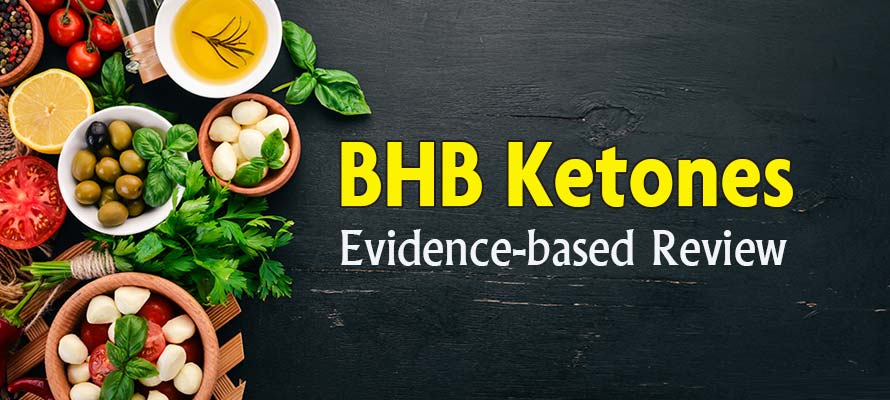What are BHB Ketones?
To understand the appeal of supplementing BHB ketones, let’s first review the basics of the ketogenic diet.
A ketogenic diet is one that limits carbohydrates to 5-10% of your daily calories. Carbohydrates break down into glucose, which is the body’s preferred source of energy.
Without the usual amount of glucose, your body will switch to burning fat as energy.
This metabolic jackpot is appealing for most people, however, once they find that for a ketogenic diet you need to consume around 70% of your calories from fat, they find it difficult to sustain.
BHB ketones are water-soluble molecules that can provide an energy source for the brain when glucose is absent.
The use of supplemental BHB ketones to induce the effect of ketosis without having to adhere to the strict keto diet has gained recent popularity.
Consuming large amounts of BHB ketones will indeed increase your blood ketone levels and mimic ketosis.
Although, if you are still consuming carbohydrates, your body will continue to choose glucose as the energy source instead of the ketones.
Types of BHB ketone supplements
The two most common BHB ketone supplements are ketone salts and ketone esters.
Ketone salts: ketones that are bound to an electrolyte such as calcium, sodium, magnesium, or potassium.
The salt bound to the ketone may inhibit the absorption of the ketone. Therefore you may not be getting the full dose you think you are.
Ketone esters: a monoester links to BHB ketone to create D-Beta Hydroxybutyrate. Ketone esters are typically packaged as a drink and are more potent than ketone salts.
What the Research Says About BHB Ketones?
Research for BHB ketones is incomplete, and as with most supplements, more research is needed to confirm the following findings.
Ketone Supplements May Help Burn Fat
One study published in 2017 found the effect of supplemental ketone salts consumed on an empty stomach increased fat oxidation during cycling exercises in healthy adult males[1].
Ten men with average body mass were given 0.3 gm/kg ketone salts or a placebo before cycling. The group who consumed the ketone supplements burned more fat than the men who took the placebo[1].
Ketone Supplements and Appetite Suppression
A study completed in 2018 tested ketone supplementation against ghrelin levels and found that the test subjects who received the supplement had decreased levels of the hormone in their blood than the test subjects who received the placebo[2].
Ghrelin is a hormone that signals the brain that it is time to eat. A decreased amount of ghrelin may result in reduced appetite.
Ketone Supplements May Lower Blood Glucose Levels
Another study noted that ketone supplements might do more for the body than help with fat loss.
A group of scientists gave a ketone monoester drink to 15 fasted individuals with obesity before a 2-hour oral glucose tolerance test to each individual[3].
The scientists then tested blood glucose levels, which were lower in the group who consumed the ketone drink. Insulin levels remained unremarkable, suggesting the ketone supplement may improve metabolic control.
Ketone Supplementation May Not Yield Cognitive Advantages
Ketone supplements have been tested for improvements in cognition as well — a study completed in 2019 tested ketone salts on college-aged students.
Ketone supplements in the amount of 0.38 gm/kg of body mass were given to half the students, and a placebo was given to the other half [4].
A mental arithmetic challenge was given to each student. The group who took the ketone supplement did not provide better results on the test than the placebo group, suggesting ketone salt supplements are not effective in gaining a cognitive advantage.
Another study in 2019 tested ketone supplementation on cognitive performance via a multitasking test and reaction time test.
This study also concluded there was no difference in the performance of the placebo group to the group who received the supplement.
Potential Side Effects
Ketone supplementation is relatively new, and long-term side effects have not been studied. Many professionals will caution the use of ketone supplements until long term effects are known.
Short-term side effects include upset stomach, nausea, diarrhea, unpleasant taste, and increased risk for hypertension.
Ketone supplements are also expensive, and most manufacturers recommend taking up to 3 servings per day.
Summary
- BHB ketones are water-soluble molecules that can provide an energy source for the brain when glucose is absent.
- The two most common BHB ketone supplements are ketone salts and ketone esters.
- Research shows BHB ketone supplements may help the body burn fat if the person is exercising on an empty stomach.
- BHB ketones may help suppress appetite which can lead to weight loss
- BHB Ketone supplements may help decrease blood glucose levels
- BHB ketones have not been shown to provide cognitive advantages
- The long-term side effects of ketone supplementation are unknown
- Short term side effects include gastrointestinal distress and increased risk of hypertension
SOURCES
Health Insiders relies on peer-reviewed studies, academic research institutions, and medical associations. We avoid using tertiary references. You can learn more about how we ensure our content is accurate and current by reading our editorial policy.
[1] O'Malley T, Myette-Cote E, Durrer C, Little JP. Nutritional ketone salts increase fat oxidation but impair high-intensity exercise performance in healthy adult males. Appl Physiol Nutr Metab. 2017 Oct;42(10):1031-1035. doi: 10.1139/apnm-2016-0641. Epub 2017 Jul 27. PMID: 28750585..
[2] Stubbs BJ, Cox PJ, Evans RD, Cyranka M, Clarke K, de Wet H. A Ketone Ester Drink Lowers Human Ghrelin and Appetite. Obesity (Silver Spring). 2018;26(2):269–273. doi:10.1002/oby.22051
[3] Myette-Côté É, Caldwell HG, Ainslie PN, Clarke K, Little JP. A ketone monoester drink reduces the glycemic response to an oral glucose challenge in individuals with obesity: a randomized trial. Am J Clin Nutr. 2019 Dec 1;110(6):1491-1501. doi: 10.1093/ajcn/nqz232. PMID: 31599919; PMCID: PMC6885474.
[4] Waldman HS, Shepherd BD, Egan B, McAllister MJ. Exogenous Ketone Salts Do Not Improve Cognitive Performance During a Dual-Stress Challenge. Int J Sport Nutr Exerc Metab. 2019 Nov 21:1-8. doi: 10.1123/ijsnem.2019-0122. Epub ahead of print. PMID: 31751935.
[5] Evans, M., McSwiney, F. T., Brady, A. J., & Egan, B. (2019, December). No Benefit of Ingestion of a Ketone Monoester Supplement on 10-km Running Performance. Retrieved from https://pubmed.ncbi.nlm.nih.gov/31730565/.
[6] Evans M, McSwiney FT, Brady AJ, Egan B. No Benefit of Ingestion of a Ketone Monoester Supplement on 10-km Running Performance. Med Sci Sports Exerc. 2019 Dec;51(12):2506-2515. doi: 10.1249/MSS.0000000000002065. PMID: 31730565.


 This article changed my life!
This article changed my life!
 This article was informative.
This article was informative.
 I have a medical question.
I have a medical question.
 Ask a Question
Ask a Question

 This article contains incorrect information.
This article contains incorrect information.
 This article doesn’t have the information I’m looking for.
This article doesn’t have the information I’m looking for.